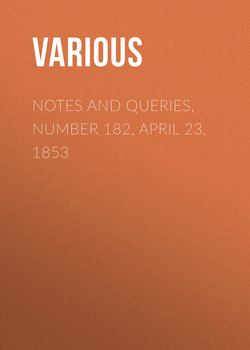Notes and Queries, Number 182, April 23, 1853

Реклама. ООО «ЛитРес», ИНН: 7719571260.
Оглавление
Various. Notes and Queries, Number 182, April 23, 1853
Notes
POETICAL EPITHETS OF THE NIGHTINGALE
ON A PASSAGE IN OROSIUS
NOTES ON SEVERAL MISUNDERSTOOD WORDS
A WORK ON THE MACROCOSM
DR. SOUTH'S LATIN TRACT AGAINST SHERLOCK
SHAKSPEARE CORRESPONDENCE
Minor Notes
Queries
SATIRICAL PLAYING CARDS
MOVABLE METAL TYPES ANNO 1435
PORTRAITS AT BRICKWALL HOUSE
Minor Queries
Minor Queries with Answers
Replies
EDMUND SPENSER, AND SPENSERS, OR SPENCERS, OF HURSTWOOD
THROWING OLD SHOES FOR LUCK
ORKNEYS IN PAWN
HOGARTH'S PICTURES
PHANTOM BELLS AND LOST CHURCHES
PHOTOGRAPHIC NOTES AND QUERIES
Replies to Minor Queries
Miscellaneous
BOOKS AND ODD VOLUMES
WANTED TO PURCHASE
Notices to Correspondents
Отрывок из книги
Having lately been making some research among our British poets, as to the character of the nightingale's song, I was much struck with the great quantity and diversity of epithets that I found applied to the bird. The difference of opinion that has existed with regard to the quality of its song, has of course led the poetical adherents of either side to couple the nightingale's name with that very great variety of adjectives which I shall presently set down in a tabular form, with the names of the poetical sponsors attached thereto. And, in making this the subject of a Note, I am only opening up an old Query; for the character of the nightingale's song has often been a matter for discussion, not only for poets and scribblers, but even for great statesmen like Fox, who, amid all the anxieties of a political life, could yet find time to defend the nightingale from being a "most musical, most melancholy" bird.
Coleridge's onslaught upon this line, in his poem of "The Nightingale," must be well known to all lovers of poetry; and his re-christening of the bird by that epithet which Chaucer had before given it:
.....
In addition to these 109 epithets, others might be added of a fuller character; such as "Queen of all the quire" (Chaucer), "Night-music's king" (Richard Barnfield, 1549), "Angel of the spring" (Ben Jonson), "Music's best seed-plot" (Crashaw), "Best poet of the grove" (Thomson), "Sweet poet of the woods" (Mrs. Charlotte Smith), "Dryad of the trees" (Keats), "Sappho of the dell" (Hood); but the foregoing list of simple adjectives (which doubtless could be greatly increased by a more extended poetical reading) sufficiently demonstrates the popularity of the nightingale as a poetical embellishment, and would, perhaps, tend to prove that a greater diversity of epithets have been bestowed upon the nightingale than have been given to any other song-bird.
There should not be any comma, or other stop, at body, because the sense is—"The root of that stock is amid man's body."
.....